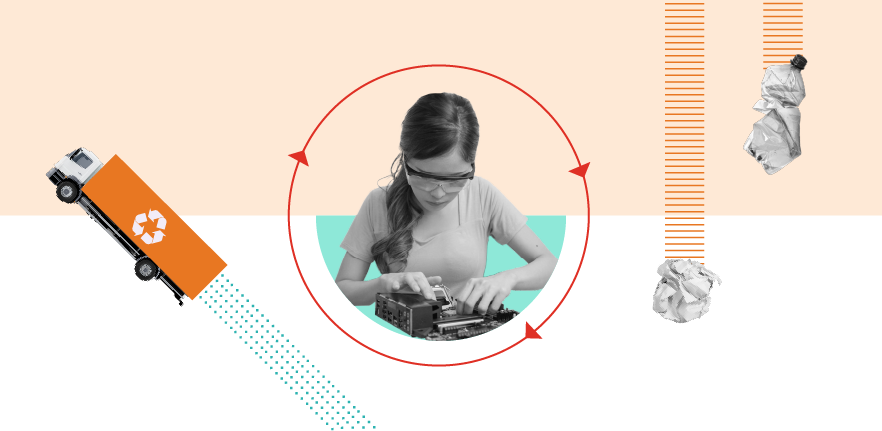Waste and circular economy

As a research-intensive University with a large and varied estate, we generate many different types of waste. We’re increasingly placing a focus on reducing the amount of waste that our operations and activities give rise to in the first place.
Our commitments
We have adopted targets to:
- Send zero waste to landfill via our main non-hazardous and chemical hazardous waste contracts.
- Achieve a minimum 80% recycling rate for our non-hazardous waste contract.
Our approach
Operational waste
Our large waste contracts, which handle most of our waste by tonnage, feature zero to landfill commitments and sector leading recycling rate targets. Robust reporting requirements allow us to accurately reflect the amount of waste we produce and where it goes. More information is available on the Estates Division website.
Construction waste
Our major construction projects are required to achieve the highest possible score for diversion of resources from landfill using the BREEAM environmental assessment methodology. Where projects involve demolition an audit of existing materials is required to identify their potential for re-use and recycling.
Lab waste
An increasing number of our labs are joining the Laboratory Efficiency Assessment Framework (LEAF) programme. Together with the Concordat for the Environmental Sustainability of Research and Innovation Practice, for which we are a signatory, this initiative is driving sustainable resource use and reducing waste in research environments.
Laying the foundations for a Circular Economy
While we have not yet developed a dedicated circular economy strategy, we’re committed to investigating and implementing practices that support these principles. This early-stage focus allows us to identify the most effective ways to integrate circularity into the University's operations and culture.
Our commitment to a more sustainable, circular approach can already be seen in several University initiatives:
- Sustainable Procurement: The Environmental Sustainability Team works closely with our Procurement Services and suppliers to prioritise sustainable and reusable products. By selecting items with longer lifespans or recyclable materials, we aim to reduce waste and minimise our environmental footprint. Sustainable procurement has also recently been added to the University’s Procurement and Purchasing training, helping to instil best practice across our purchasing processes. In collaboration with Procurement Services, the Environmental Sustainability Team implements continuous improvement within the Strategic Procurement and Purchasing (SPP) program. We’re committed to a minimum 10% weighting for sustainability criteria within SPP, and to setting even higher weightings where appropriate depending on the specific contract.
- Reuse and Resource Sharing: The University provide tools such as the WARPit: reuse platform, enabling departments to rehome equipment, furniture, and other items. The Cambridge Equipment Sharing Database also facilitates the lending and booking of research equipment across the estate. These initiatives reduce the need for new purchases, prolong the life of existing resources, and promote efficient use of materials to help minimise waste generation or unnecessary research travel.
- Reducing Single-Use Items: The University is actively working to phase out single-use items where possible. For instance, Greenwich House has stopped ordering paper cups, encouraging staff to use mugs instead, saving an estimated 35,000 cups and 3.5 mature trees each year.
- Recycling: Waste minimisation is a core priority for the University. However, when items can’t be reused or repaired, recycling ensures that valuable materials remain in use. Through increased recycling efforts (including an 80% recycling target for the main waste contract) and effective waste management, we reduce reliance on incineration and conserve resources.
What is a circular economy?
The circular economy is a system where materials never become waste and nature is regenerated. In a circular economy, products and materials are kept in circulation through processes like maintenance, reuse, refurbishment, recycling, and composting. The circular economy tackles climate change and other global challenges, like biodiversity loss, waste, and pollution, by decoupling economic activity from the consumption of finite resources.
By embedding these principles, we aim to reduce our environmental impact, conserve resources, and support sustainability at the University, broader community and supply chain.
Our progress
Read about our Waste and circular economy progress.
